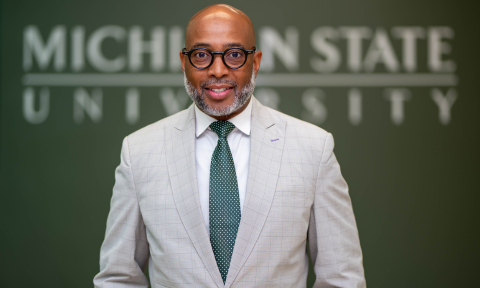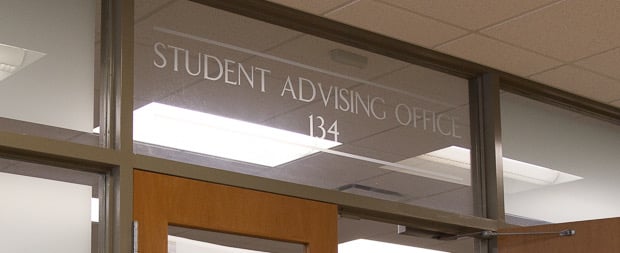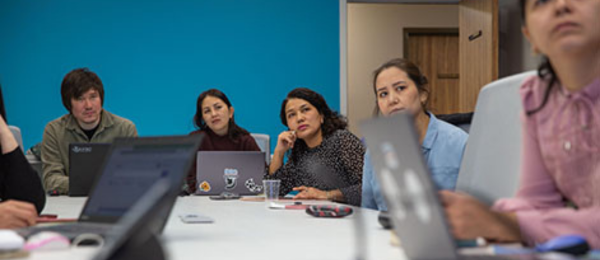Connecting 2025 RLF Lessons to Michigan EPLP Fellows’ Educational Leadership Practices
As covered in the September 2025 In Focus newsletter, this fall delivered the start of the 51st Michigan Education Policy Leadership Program (EPLP) year, with three co-coordinators from the Office of K-12 Outreach and 26 Fellows from various governmental and educational entities across Michigan uniting for ten months of professional learning focused on policy, leadership, and networking. While a significant portion of each Michigan EPLP year is dedicated to this first thread, with Fellows delivering policy-oriented Learning Team presentations with their peers, completing an individual policy poster project with recommendations for decision-makers, traveling to our nation’s capital for the DC Field Experience, and engaging with elected officials during a Day at the Michigan Capitol, annually, this professional learning experience begins with an emphasis on the leadership and networking threads. Consequently, during their first two 2025-26 Michigan EPLP sessions in September on MSU’s campus, the Fellows focused on enhancing their leadership skills (through their familiarization with some resources to amplify their capacity for policy entrepreneurship and their use of the Myers-Briggs Type Indicator and the Thomas-Kilmann Conflict Mode Instrument to assess their leadership proclivities) and broadening their professional networks (via protocols to get to know everyone in the cohort, a personal network mapping activity, and a consideration of leadership networking best practices based on research and Fellows’ past experiences). Notably, this initial emphasis on leadership and networking is a purposeful curricular choice to help Fellows understand their capacity to make a positive impact on education policy, appreciate the many individuals already in their network with whom they can advocate, and feel comfortable in a professional learning community before delving into difficult and controversial policy topics.
To wrap up this initial consideration of leadership and networking, the 2025-26 Michigan EPLP Fellows traveled to Pennsylvania for the 2025 Regional Leadership Forum (RLF) on Thursday, October 9th, and Friday, October 10th. Meeting the Michigan contingent in the Keystone State were peers from New York, Ohio, and Pennsylvania in analogous professional learning programs who were similarly invested in learning from the Battle of Gettysburg and the U.S. Army War College, along with expanding their networks and reach. Broadly speaking, this conference uses site visits, battlefield tours, seminars, facilitated discussions, and chances for collegiality to help attendees connect leadership lessons from the military context to their education-related workplaces. Whether stemming from this 1863 Civil War battle or contemporary professional military education for the U.S. Army’s future leaders, Fellows are asked to creatively reflect on and plan to apply leadership insights related to effective delegation, clear communication, the importance of unifying narratives and values, change management, the incorporation of emerging technologies, unit motivation, strategic thinking, contingency planning, and the centrality of people’s personalities and humanity to organizational effectiveness. Outside of leadership development, the RLF also offers participants the opportunity to connect more deeply with their state cohort members, get to know professionals in other states, glean insights concerning education practices and policies elsewhere in the United States, and reflect on their motivations for participating in this learning journey.
In pursuit of attaining these goals, day one of the 2025 RLF kicked off at the Gettysburg Battlefield, about 45 minutes away from the conference’s home base in Carlisle, Pennsylvania. While at the Gettysburg National Military Park Museum and Visitor Center, the Michigan, New York, Ohio, and Pennsylvania Fellows brushed up on their Civil War knowledge to prepare for a staff ride through the battlefield that would discuss the two sides’ leaders, tactics, strategy, blunders, and successes. In particular, the group reviewed the historical displays spread across the Gettysburg Museum, tuned in to the “A New Birth of Freedom” film that welcomes all battlefield visitors, and experienced the awe-inspiring Gettysburg Cyclorama, which depicts Pickett’s Charge. With this refresher, the Fellows were ready to transition to an expert-led, bus-and-walking tour of the battlefield with certified Gettysburg guides. Throughout the morning and early afternoon, these skilled historians took the group to all the essential Gettysburg sites, including McPherson Ridge, Cemetery Hill, Seminary Ridge, Cemetery Ridge, Culp’s Hill, Devil’s Den, the Wheatfield, the Peach Orchard, the Pennsylvania Memorial, the Eternal Light Peace Memorial, and Little Round Top. Along the way, the guides not only told the story of the battle and its place in the broader Civil War but also flagged essential leadership decisions by commanders at the time of the conflict and invited Fellows to reflect on how these insights could shape their educational leadership practices. By the end of the multi-hour tour and conversation, the Fellows were ready to return to Carlisle, Pennsylvania, for a reception at the Cumberland County Historical Society, where they could share some initial reflections, reconnect with Fellows from Michigan and other states that they might have only had a brief moment to meet, and decompress from an arduous day of learning.
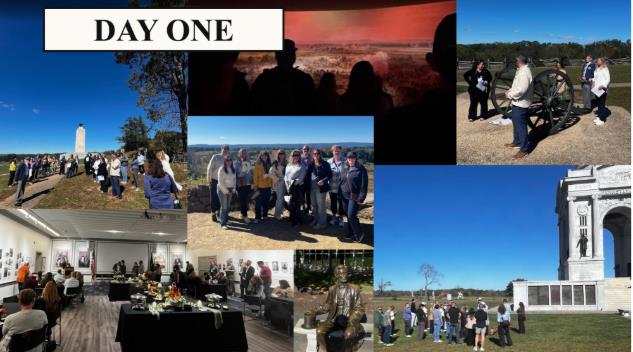
As the 2025 RLF continued with its second day on Friday, October 10th, the various state cohorts in attendance were ready to move from 1863 to 2025 and grow from the perspectives of various U.S. Army War College representatives. While the group would traditionally traverse to the Carlisle Barracks to be present at this institution, the federal government shutdown meant that the group stayed at the RLF hotel for these presentations, which these experts so generously volunteered their time to give. Thankfully, while the setting for this content was different than normal, the seminars’ content was just as exceptional as always. To initiate the day, Colonel Jeff Wills of the U.S. Air Force and Lieutenant Colonel David Zesinger of the U.S. Space Force shared their reflections on leadership lessons from the Battle of Gettysburg based on the curriculum taught at the U.S. Army War College. Additionally, they solicited takeaways from the EPLP Fellows present, given these individuals' expertise in the education space. From there, the gathering transitioned to more centrally digging into how the U.S. Army War College prepares its students. First, Colonel John Gianelloni, Acting Dean of the U.S. Army War College and Chair of the Department of Command, Leadership and Management (DCLM), introduced this institution’s mission, what it teaches, the types of leaders it seeks to cultivate, and how it develops military professionals. Then, Colonel Heather Smigowski, Chair for the Department of Distance Education at the U.S. Army War College, shared the intricacies of how they prepare strategic leaders and some of their best practices when it comes to models of hybrid education. After that, Colonel Fred Maddox, U.S. Army War College Assistant Professor in the Department of Command, Leadership, and Management, gave a talk titled “Learning from Failure.” In it, he covered how leaders can build an organizational culture that celebrates shared failures connected to continuous improvement, different frameworks for understanding failure, the types of failure to seek, and personal and professional experiences of growth from not hitting the mark. Finally, after lunch, Commander Mike Posey, Assistant Professor at the U.S. Army War College, shared how this entity worked through reforms to its curriculum, both to explore themes of educational leadership and to flag strategies for helping drive organizational change. Altogether, these guest speakers from one of the military’s preeminent learning institutions helped the Fellows identify leadership lessons from their time in Pennsylvania, reflect on their capacity to effectively guide their organizations, and learn some best practices they might consider employing.
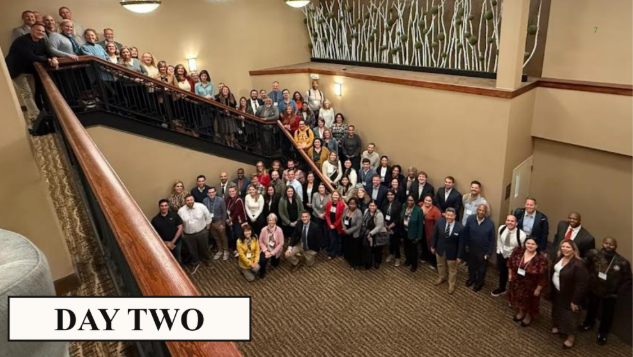
At Michigan EPLP’s next 2025-26 session on Monday, November 3rd, the cohort will begin with some individual, small group, and whole cohort reflection on the 2025 RLF. Subsequently, they will transition to thinking about how the group, as a collection of educational leaders, can effectuate policy changes on topics relevant to them, their students, and their local communities. While the next few Michigan EPLP gatherings will then prioritize education policy essentials, including a survey of core actors in this space, the various components of the policy cycle, and an investigation of some particularly salient education policy controversies, the Fellows will be consistently reminded of the leadership lessons they identified during the first few sessions of the 2025-26 year, including at the RLF with peers from New York, Ohio, and Pennsylvania. Likewise, they will be asked to leverage their newly-expanded professional networks as they design policy recommendations to share with the rest of the cohort, state and federal government officials, and their organizational leaders. As the 2025-26 Michigan EPLP Fellows continue their growth and further accomplish the learning objectives that they ventured out to tackle, their progress will be featured in future editions of In Focus. Until then, readers eager to learn more about the Michigan EPLP experience can email Co-Coordinator Tyler Thur at thurtyle@msu.edu.
